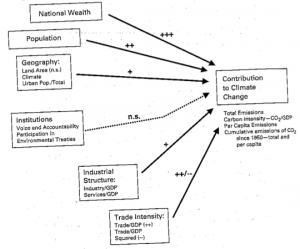Dickinson to Durban » Climate Change, Environmental Politics » Fair Share
Fair Share
Harriet Bulkeley and Peter Newell (2010) explain the contemporary politics of global climate change with accounts of suspicion, inequality, and skepticism. Pointing fingers and holding responsibilities are things involved with every political issue throughout history. When it comes to global climate change, the unethical implications behind actions of developed countries make it easy to see who is responsible for causing, and in turn, preventing climate change from reaching drastic tribulations.
Evidence shows that developed countries are indeed most responsible for the causes of climate change; the irony in this is that developing countries will be most affected by impacts of the changing climate. Bulkeley and Newell (2010) suggest “This sense of injustice derives from the fact that those who have contributed least to the problem of climate change in the past, including most of the world’s poor, are those most susceptible to its worst effects now and in the future. Meanwhile, richer countries are better placed to adapt to the climate impacts that they will suffer” (page 36). It is the lesser-developed countries that have contributed least to global climate change; however, it is those same lesser-developed countries that are taking the wrath of this changing climate. This brings up the question: who is responsible for preventing dangerous climate change?

Roberts & Parks (2007) Contributors to Climate Change
Roberts and Parks (2007) suggest an answer to such a question in the article “Fueling Injustice: Emissions, Development Paths, and Responsibility.” It is suggested that the United States is making an inconsistent contribution to the potential decline of impacts caused by global climate change. This proves that although a main contributor to total greenhouse gas emissions, as well as per capita emissions, the United States is providing very little solution to the problems that developing nations will soon face. The figure above, from Roberts and Parks (2007) provides a representation of which factors most contribute to climate change. Among these are wealth, population, geography, institutions, industrial structure, and trade intensity. The United States provides high contributions in a number of these areas. This is evidence that overall, the United States plays a major role in causing climate change.
So, why is it that the United States plays a relatively small role in preventing the dangerous impacts of climate change? Considering the inequity between countries regarding per capita emissions, it will be extremely difficult to decide on future international agreements and global climate policies (Buckeley & Newell, 2010). Eventually, it will all come down to someone taking responsibility for actions.
Works Cited:
Bulkeley, H., and P. Newell, 2010. Governing Climate Change. Routledge, New York. pp. 35-53.
Roberts & Parks, 2007. “Fueling Injustice: Emissions, Development Paths, and Responsibility.” In Roberts & Parks, A Climate of Injustice, MIT Press, Cambridge, MA, pp. 133-184.
Filed under: Climate Change, Environmental Politics · Tags: Bulkeley and Newell, climate change, Roberts and Parks








Recent Comments